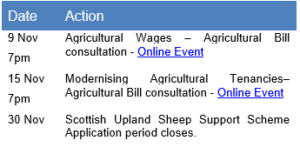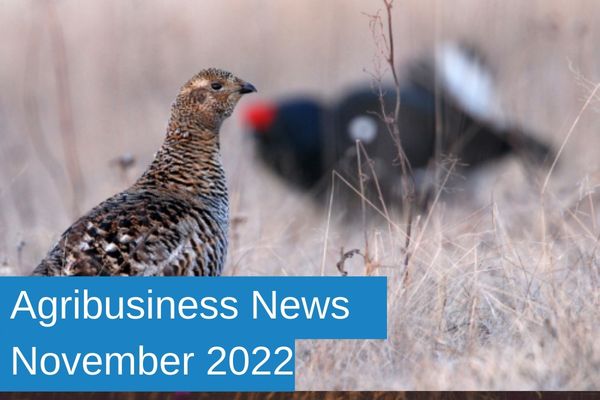Agribusiness News November 2022 – Policy Briefs
1 November 2022Avian Influenza (Bird Flu) Update
Following an increase in the number of detections of a highly pathogen strain of avian influenza (HPAI) H5N1 being confirmed in wild birds and other captive birds, the Chief Veterinary Officers from Scotland, England & Wales have declared an Avian Influenza Prevention Zone across Great Britain.
This GB-wide zone introduces strict biosecurity measures for all bird keepers (including those who keep pet birds) to mitigate the risk of the disease spreading amongst poultry and other captive birds. Keepers of all birds (including pet birds) should familiarise themselves with the avian flu advice at www.gov.scot/avianinfluenza and report suspicion of disease to your local APHA Field Services Office.
New Wildlife (Grouse Moor) Bill Consultation
Following on from the 2019 Werritty Grouse Moor Management Report, tighter laws around grouse shooting in Scotland are being considered, in an effort to protect wildlife and the environment, and to ensure that grouse moors are managed in a sustainable way; the consultation will seek views on a wide range of topics related to wildlife including:
- introducing a licensing scheme for grouse shooting,
- increased regulation of muirburn – the burning of vegetation to maintain moorland,
- banning the use of glue traps, and
- increased regulation of other wildlife traps.
For further information click here. The consultation process ends on the 8th of December 2022.
Short Term Lets Licensing Scheme
To ensure all short-term lets are safe and to assist with handling complaints and address issues faced by neighbours, ‘Short Term Lets Licensing Scheme’ legislation has been passed that requires properties being used as short term lets to be licensed.
From October 2022, new hosts must apply for a licence and all existing short term let hosts must have applied for a licence by 1 April 2023. You can check the Scottish Government Guidance to establish if your property will be required to be licensed and what you are required to do.
Tenant Protection Act becomes law
In response to the cost-of-living crisis and following on from legislation introduced during the Covid pandemic, under the temporary power afforded under the Cost of Living (Tenant Protection) Bill, the Scottish Government has introduced a cap on rents for residential tenancies. The rent rise cap has initially been set at 0% and will be in place until at least 31st of March 2023, with provision made for two further 6-month extension periods. The Bill also introduced a moratorium on evictions except in a number of specified circumstances. Damages for unlawful evictions have been set at 36 months rental equivalent.
Further afield:
EU: Fertiliser
As part of efforts to tackle the disruption caused by the Ukraine war, the EU has announced it will publish its long awaited ‘Communication on Fertilisers’ on the 9th of November. While the communication will cover the availability and affordability of fertilisers at both EU and global level; of greatest interest will be how the EU proposed to make the fertiliser industry less externally dependent, while simultaneously exploring ways to make EU farmers less dependent on fertilisers. In the meantime, as the EU seeks to strengthen its free trade agreements to improve its global access to fertilisers, it is proposing a temporary suspension of customs tariffs on ammonia and urea until the end of 2024.
NZ banning live exports
Linked to the tragic loss of 6,000 cattle and 41 crew when the Gulf Livestock 1 sank in high seas in 2020, and the recent Free Trade Agreement negotiations with the UK and the EU, New Zealand MPs have approved a new ‘Animal Welfare Amendment’ Bill banning live exports by sea on the 30th of April 2023.
Somewhat ironically, the UK Kept Animals Bill which includes the banning of live exports for slaughter/fattening is still progressing through Parliament. Australia has also confirmed its commitment to ban live exports, but it is not expected to be introduced before 2025.
Key dates
Sign up to the FAS newsletter
Receive updates on news, events and publications from Scotland’s Farm Advisory Service


